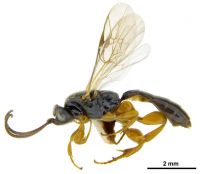ICHNEUMONIDAE: : Carria Schmiedeknecht 1924
Diagnosis:
Characteristics of Carria include: 1. Body size <10mm; 2. Position of spiracle on T1 at, close to, or before centre; 3. Shape of aerolet in forewing triangulate; 4. Colour of face only black; 5. Metasoma compressed dorsal-ventrally; 6. Size of ocelli small; 7. Length of antennae shorter than body; 8. Length of ovipositor barely visible; 9. Wings present; 10. Colour of wings hyaline (clear); 11. Sternaulus absent; 12. Shape of face in lateral view strongly bulging; 13. Sternite on T1 (viewed laterally) not extending past spiracle; 14. Shape of T1 (viewed laterally) evenly curved; 15. Number of teeth in mandibles 2; 16. Metasoma same colour throughout; 17. Length of T1 vs T2 subequal in length; 18. Sculpture on mesoscutum finely pitted, many hairs; 19. Width of T1 (viewed dorsally) gradually widening from anterior to posterior; 20. Glymma on T1 present, (deep pit); 21. Sculpture on metasoma punctured (sometimes less densly or densly punctured); 22. Propodeum reaching past coxal insertion, but not reaching halfway along metacoxae).Similarity to Other Taxa
Carria (and other genera of the subfamily Metopiinae) have a ' bulging face', which seperates them from almost all other genera. Carria is also quite ' stocky' in appearance, with the hind coxa and femur large. Carria can be seperated from other genera of the subfamily Metopiinae by using the key of Berry (1990).Some small Aucklandella also have a 'bulging face' but these species have colourful bodies (Metopiinae are black), and they also have the spiracle of T1 well behind the centre (in Metopiinae the spiracle on T1 is at, close to, or before centre).
Stenomacrus (Orthocentrinae) also has a bulging face. However, it can be seperated from genera of the subfamily Metopiinae which have a small triangular process between the antennae, and the malar space lacks a subocular groove.
Compare
-

Hypsicera
Transverse carina on the propodeum, propodeum very polished; areolet is open in the forewing. -

Sciron
Has a more elongate T1 (2x as long as its width), the occipital carina present (at least dorsally).
Distribution in NZ
North Island: ND, AK, BP, GB, HB, TO, WI, WN, WO, RI. South Island: NN, BR, MC, SC, DN, CO, OL, WD, FD, SI, KA, SL.
Species in NZ
One endemic species, Carria fortipes (Cameron 1898).Biology & hosts
A small genus, which is widely distributed, although most of the species occur in Australia, New Zealand and New Guinea (Gauld 1984).Little is known about the Carria fortipes , although Berry (1990) comments on its morphological variation and taxonomy, and also lists several hosts: Pyrgotis plagiatana , Planotortrix excessan , Epalxiphora axenana , Ctenopseutis obliquana , and Ctenopseustis sp. (all Lepidoptera: Tortricidae). It is widespread but not common.
Sources of information
Berry JA. 1990. The New Zealand species of the subfamily Metopiinae (Hymenoptera: Ichneumonidae). New Zealand Journal of Zoology 17: 607-614.Gauld ID. 1984. An Introduction to the Ichneumonidae of Australia. London, British Museum (Natural History). 413 p
Citation
Ward DF & Schnitzler FR. 2013. Ichneumonidae of New Zealand. Genus Carria http://ichneumonidae.landcareresearch.co.nzAccessed: 22 January 2025




